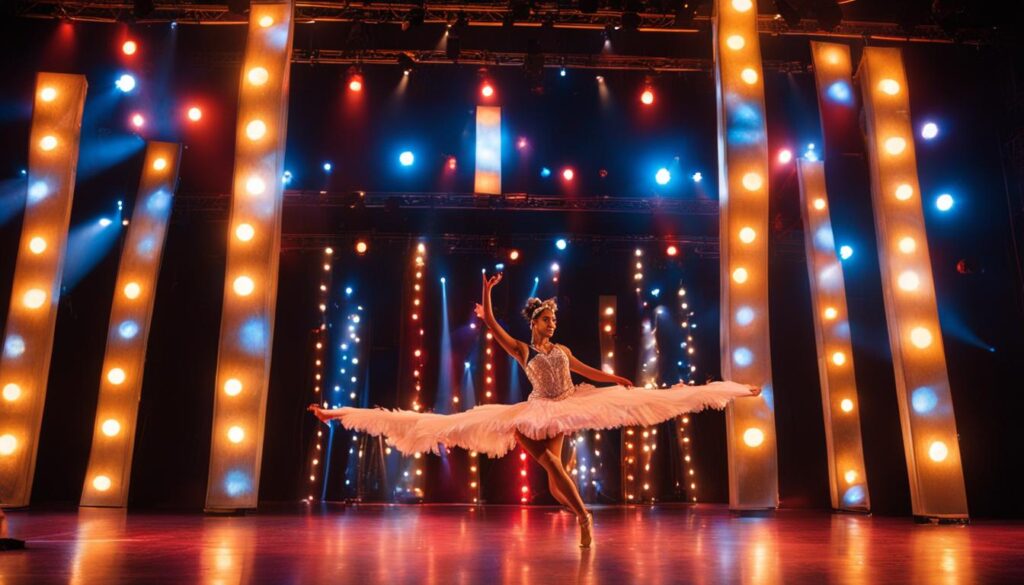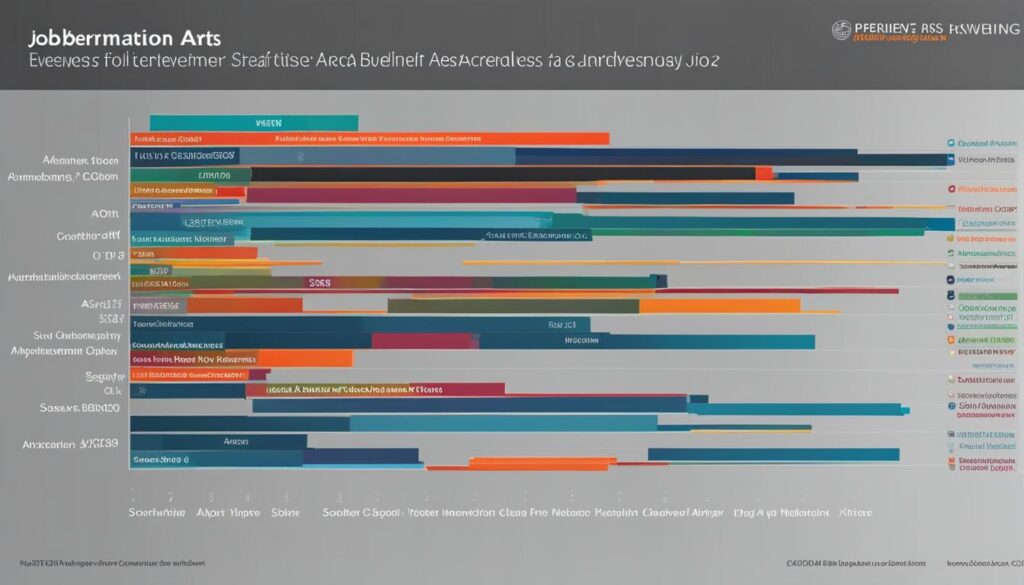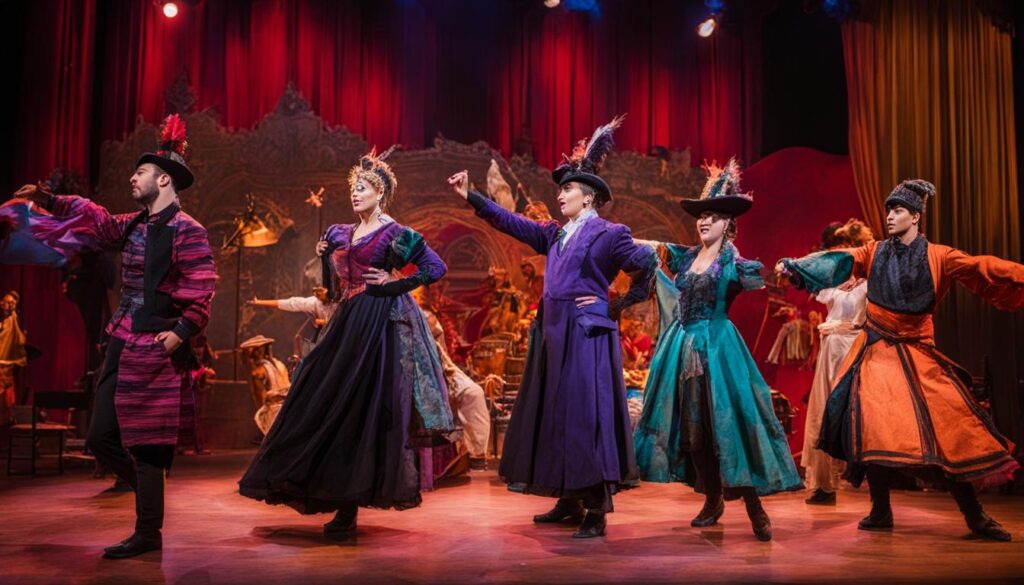Greetings! In today’s article, I will be diving into the exciting world of performing arts and exploring the wide range of career opportunities available to individuals with a performing arts degree. Whether you’re a talented actor, a skilled dancer, or have a passion for directing, the performing arts industry holds countless possibilities for those who are passionate about creative expression.
Are you wondering what job you can get with a performing arts degree? Look no further! I’ll be discussing various career options, salary prospects, required skills, and degree programs to help you navigate your path in the performing arts industry. Let’s delve deeper into the enchanting world of performing arts and unlock the doors to a bright future in this captivating field.
Key Takeaways:
- The performing arts industry offers a diverse range of career options for individuals with a performing arts degree.
- Careers in performing arts extend beyond acting and encompass fields like dancing, singing, directing, and more.
- When pursuing a performing arts degree, it’s essential to consider the different majors and degrees offered by various universities.
- The salary and job outlook for performing artists can vary based on experience, location, and the specific job.
- Performing artists require a unique set of skills, including confidence, resilience, teamwork, and creativity.
Now that we’ve covered the basics, let’s dive deeper into the world of performing arts careers and explore the limitless possibilities that await individuals with a performing arts degree.
Careers in Performing Arts
The world of performing arts offers a wide range of exciting and fulfilling career opportunities. While many people associate performing arts with acting, there are numerous other paths to explore within this dynamic industry. From dancers and singers to comedians and opera singers, the performing arts provide a diverse array of career options.
When it comes to jobs in performing arts, the possibilities are vast. Whether you dream of gracing the stage as an actor, captivating audiences through dance, or showcasing your vocal talents as a singer, there are countless avenues to pursue. For those with a flair for comedy or a talent for ventriloquism, comedy clubs and variety shows provide an ideal platform to showcase your skills.
“Performing arts careers are not limited to traditional roles. They extend into fields like marketing, public relations, and journalism, where individuals with a performing arts degree can use their creativity and communication skills to excel.”
While some may assume that careers in performing arts are exclusively confined to the stage, this is not the case. Performing artists can also find fulfilling careers behind the scenes as directors, choreographers, set designers, and stage managers. Additionally, performing arts graduates can explore opportunities in arts administration, teaching, therapy, and other related fields.
| Career | Description |
|---|---|
| Actor | Delivers performances in plays, films, television shows, and commercials. |
| Dancer | Expresses ideas and emotions through movement and choreography. |
| Singer | Uses their voice to entertain and captivate audiences through musical performances. |
| Director | Oversees the artistic vision and execution of a theatrical or film production. |
| Stage Manager | Coordinates and ensures smooth running of performances, managing technical aspects and actors. |
| Marketing Specialist | Promotes performing arts events, manages social media, and develops advertising campaigns. |
With a performing arts degree, the possibilities are truly endless. Whether your passion lies in front of an audience or behind the scenes, a career in performing arts can be both rewarding and fulfilling, allowing you to express your creativity and make a meaningful impact in the world of entertainment and beyond.


Degrees and Majors in Performing Arts
When considering a career in the performing arts, it is essential to explore the different degrees and majors offered by colleges and universities. These programs provide aspiring performers with the education and skills necessary to succeed in their chosen discipline. Whether you have a passion for acting, dance, music, or any other aspect of performing arts, there are various options available to pursue your dreams.
Degree Programs
Institutions offering performing arts degrees typically provide Bachelor of Fine Arts (BFA) or Bachelor of Arts (BA) programs. A BFA program focuses on training students in their chosen performing arts discipline, providing intense coursework and practical experience. On the other hand, a BA program offers a more comprehensive education in the performing arts, including coursework in theater history, dramatic literature, and other related subjects.
Some universities also offer Master of Fine Arts (MFA) programs, which are geared towards individuals seeking advanced training and specialization in their field. These programs often require a bachelor’s degree in performing arts or a related discipline.
Major Specializations
Within performing arts degree programs, there are various major specializations to choose from. Here are a few examples:
- Theater: This major combines acting, stagecraft, and dramatic literature to prepare students for careers on stage.
- Dance: A dance major focuses on technique, choreography, and performance skills, preparing students for careers as professional dancers.
- Music: This major includes specialized training in voice, instruments, and music theory, preparing students for careers as musicians, vocalists, or composers.
- Film and Television: This major combines acting, screenwriting, and production skills for careers in the film and television industry.
These are just a few examples, and there may be other specialized majors available depending on the institution. It’s important to research and consider your interests and career goals when choosing a major within the performing arts.
| Degree Program | Specializations |
|---|---|
| Bachelor of Fine Arts (BFA) | Theater, Dance, Music, Film and Television, and more |
| Bachelor of Arts (BA) | Theater, Dance, Music, Film and Television, and more |
| Master of Fine Arts (MFA) | Specialized programs based on chosen discipline |
By choosing a degree program and major specialization that aligns with your interests and goals, you can gain the necessary knowledge and skills to pursue a successful and fulfilling career in the performing arts.


Salary and Job Outlook in Performing Arts
When it comes to the salary and job outlook in the performing arts industry, it’s important to note that it can vary greatly depending on numerous factors. Performers in this field often negotiate rates based on their previous earnings and the terms of their contracts, making it difficult to provide a specific salary range. However, successful performances can lead to additional opportunities and higher earnings in the future.
It’s also worth mentioning that the job outlook for performing artists can be competitive. While there is a constant demand for talented performers, there is also a large pool of individuals vying for the same opportunities. Aspiring artists should be prepared to face challenges and work diligently to establish a successful career in the industry.
Despite these challenges, the performing arts industry offers a unique and rewarding career path for those passionate about creativity and expression. While financial stability and job security may not always be guaranteed, the opportunity to pursue one’s artistic passions and make a meaningful impact can be incredibly fulfilling.
The Importance of Diversifying Income
Given the unpredictable nature of the performing arts field, many artists choose to diversify their income streams to ensure financial stability. They may take on additional work such as teaching, coaching, or even pursuing opportunities in related fields like marketing or public relations. By expanding their skillsets and exploring different avenues, performing artists can enhance their job prospects and create a more sustainable career.


| Job Title | Average Annual Salary |
|---|---|
| Actor/Actress | $52,000 |
| Dancer | $34,000 |
| Director | $69,000 |
| Singer | $44,000 |
| Stage Manager | $53,000 |
Skills Needed in Performing Arts
In order to excel in the performing arts, individuals need a unique set of skills and qualities. These abilities go beyond natural talent and play a crucial role in shaping a successful career in this competitive industry.
One of the key skills for performing artists is confidence. They must have the self-assurance to step onto a stage or in front of a camera and captivate an audience. Confidence allows performers to showcase their talents and connect with their audience on a deep level.
Resilience is another important quality for performing artists. Rejection and criticism are common in this field, and resilience allows individuals to bounce back from setbacks and continue pursuing their dreams. It’s the ability to learn from failures and use them as stepping stones towards success.
“The essence of all art is to have pleasure in giving pleasure.”
Performing artists also need to possess strong teamwork skills. Collaborating with directors, fellow performers, choreographers, and other creative professionals is often necessary in the production of a performance. Effective communication, adaptability, and a willingness to take direction are essential in working harmoniously with others.
Creativity and out-of-the-box thinking are fundamental qualities for performing artists. They are constantly challenged to bring fresh ideas to their performances, whether it’s through improv, choreography, or interpretation of a script. The ability to think creatively allows performers to stand out from the crowd and deliver compelling and memorable performances.
The Skills Needed in Performing Arts:
- Confidence
- Resilience
- Teamwork
- Creativity
These are just a few of the skills and qualities that are crucial for success in the performing arts. Whether it’s the ability to command a stage, adapt to different roles, or collaborate effectively with others, honing these skills can help aspiring performers thrive in this dynamic and rewarding industry.


What Can You Do with a Performing Arts Degree?
Graduates with a performing arts degree have a wide range of career options available to them. While many people associate a performing arts degree with traditional roles such as actor, dancer, or singer, the truth is that the possibilities extend far beyond these occupations. With their unique skill set and creative background, performing arts graduates are well-equipped to excel in a variety of fields.
One option for performing arts degree holders is to explore careers in the entertainment industry. This can include working behind the scenes as a stage manager, director, or producer. It can also involve using your performance skills in areas such as voiceover work, motion capture, or acting in commercials. Additionally, many performing arts graduates find success as performing arts therapists, using their knowledge and talent to help others through creative expression.
Another avenue for performing arts degree holders is to pursue careers in teaching or arts education. With their in-depth understanding of performance techniques and creative processes, performing arts graduates can make excellent teachers and mentors. They can inspire the next generation of artists and help students develop their own talent and passion for the arts.
| Careers | Job Description | Salary Range |
|---|---|---|
| Actor | Portray characters in plays, movies, or TV shows. | $40,000 – $100,000+ |
| Dancer | Perform choreographed routines in various styles of dance. | $30,000 – $80,000+ |
| Director | Oversee the artistic aspects of a production and guide actors and crew. | $50,000 – $150,000+ |
| Singer | Use your voice to perform songs in various genres and settings. | $30,000 – $100,000+ |
| Stage Manager | Coordinate and oversee the technical and logistical aspects of a performance. | $40,000 – $80,000+ |
| Performing Arts Therapist | Use creative arts to help individuals improve their physical, mental, and emotional well-being. | $40,000 – $80,000+ |
| Teacher | Share your knowledge and passion for the performing arts with students. | $40,000 – $70,000+ |
Furthermore, performing arts graduates can leverage their skills in other industries such as marketing, public relations, and journalism. Their ability to captivate an audience, think creatively, and communicate effectively can make them valuable assets in these fields. Whether it’s creating compelling advertising campaigns, organizing events, or writing engaging stories, the versatility of a performing arts degree opens up numerous opportunities for career growth and professional development.
In conclusion, a performing arts degree offers a wide range of career options. From traditional performing arts roles to teaching, therapy, and beyond, graduates with a performing arts degree can find fulfilling and meaningful work in various industries. Their unique skill set and creative mindset make them valuable contributors to society, as they entertain, inspire, and engage audiences in diverse ways.


Requirements and Pathways for a Performing Arts Degree
Obtaining a performing arts degree requires meeting specific requirements and navigating various pathways. To pursue this degree, aspiring students need to fulfill certain academic criteria and consider available program options and specializations.
Academic Requirements
Admission to a performing arts degree program typically requires a high school diploma or equivalent. Some universities may have additional requirements, such as auditions or portfolios, to assess a candidate’s artistic abilities. It’s essential to research and understand the specific entry criteria of the desired program to ensure eligibility.
Program Options
Performing arts degree programs offer a range of options to cater to different interests and career goals. Students can choose to specialize in areas such as dance, music, theater, or visual arts. Some universities also offer joint honors degrees that combine performing arts with another subject, providing a multidisciplinary approach to education.
Specializations and Pathways
Within the performing arts field, students can explore various specializations and pathways based on their interests and talents. Specializations might include acting, choreography, directing, stage management, or arts administration. It’s important to consider personal strengths and aspirations when selecting a specialization to enhance career prospects.
Additionally, performing arts degrees often provide opportunities for practical training, internships, and collaborations with industry professionals. These experiences can help students develop valuable skills and networks that will benefit their future careers.
| Requirements and Pathways for a Performing Arts Degree | |
|---|---|
| Academic Requirements | High school diploma or equivalent |
| Auditions or portfolios may be required | |
| Program Options | Specializations in dance, music, theater, or visual arts |
| Joint honors degrees combining performing arts with another subject | |
| Specializations and Pathways | Acting, choreography, directing, stage management, arts administration |
Conclusion
In conclusion, a performing arts degree opens up a world of possibilities for individuals passionate about the arts. Whether you dream of gracing the stage as an actor, dancer, or singer, or prefer to explore related fields like arts administration or teaching, the skills and knowledge gained through a performing arts degree can lead to fulfilling and rewarding careers.
With a range of career options available, from traditional roles to innovative opportunities in marketing, public relations, and journalism, performing arts graduates have the flexibility to pursue their passions in various industries. The performing arts industry offers a wealth of opportunities for those with a desire for creativity and expression.
When considering a performing arts degree, it’s essential to research the different majors and degrees offered by various universities. Take the time to find the program that aligns with your career goals and aspirations. With dedication and hard work, you can develop the necessary skills, such as confidence, resilience, teamwork, and analytical thinking, to excel in your chosen discipline.
So, if you have a love for the performing arts and a desire to make a lasting impact through creativity and expression, a performing arts degree may be the perfect path for you. Embrace the opportunities available and embark on a journey that will allow you to follow your dreams and create a fulfilling and meaningful career in the world of performing arts.
FAQ
What job can I get with a performing arts degree?
With a performing arts degree, you can pursue careers in acting, dancing, broadcasting, directing, and more.
What are the career options in the performing arts industry?
The performing arts industry offers a wide range of career options, including actors, dancers, singers, comedians, opera singers, and ventriloquists.
How long does it take to complete a performing arts degree?
Typically, performing arts degrees take three to four years to complete at the undergraduate level.
What skills are needed in the performing arts field?
Performing artists require attributes such as confidence, resilience, self-reflection, teamwork, creativity, analytical thinking, and the ability to learn quickly.
What can I do with a performing arts degree?
Graduates with a performing arts degree can pursue careers as actors, dancers, directors, singers, stage managers, therapists, teachers, and also explore fields like marketing, public relations, and journalism.
What degrees and majors are available in performing arts?
Performing arts degrees offer various specializations, including arts administration, dance, music, visual arts, and some universities also offer joint honors degrees that combine performing arts with another subject.
How much can I earn in the performing arts industry?
Salaries in the performing arts industry can vary depending on the specific job, experience, and location. Successful performances can lead to additional opportunities and higher earnings.
What are the requirements for a performing arts degree?
Requirements for a performing arts degree vary between universities, but it’s important to consider different programs and majors offered to find the best fit for your career goals.

